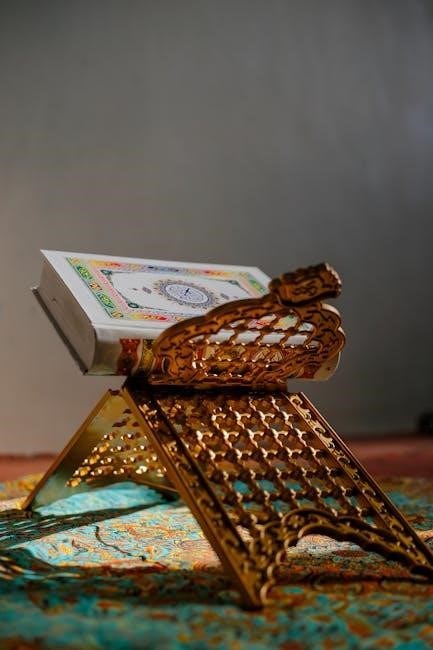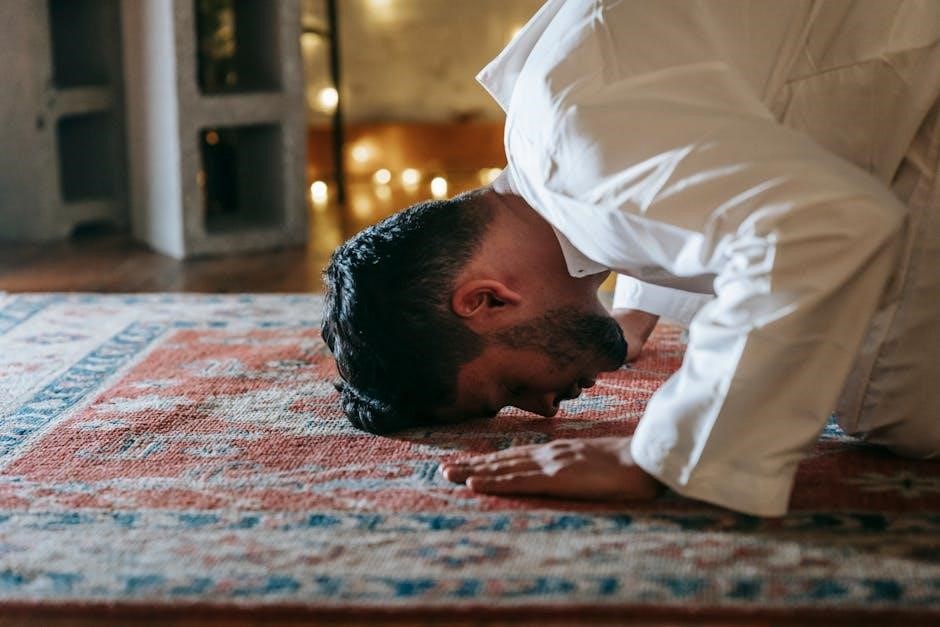Islam is a way of life, and this guide offers a practical pathway for new and seasoned Muslims alike. It compiles essential concepts and timeless wisdom, empowering individuals to live Islam daily.

Understanding the Core Beliefs
Delve into the heart of Islam, exploring the fundamental beliefs that shape a Muslim’s worldview. Grasp the essentials of faith, providing a solid foundation for understanding Islamic principles and their implications in daily life.
The Islamic Creed (Aqidah)
The Aqidah, or Islamic Creed, forms the bedrock of a Muslim’s belief system. It’s a concise yet comprehensive articulation of the core tenets that define the faith. At its heart lies the concept of Tawhid, the absolute oneness of God (Allah), free from any partners or equals. This belief permeates every aspect of a Muslim’s life, shaping their understanding of the universe and their place within it.
Furthermore, the Aqidah encompasses belief in the prophets of God, from Adam to Muhammad (peace be upon them all), recognizing them as messengers who conveyed divine guidance. It includes faith in the revealed scriptures, including the Quran, considered the final and complete revelation. Belief in angels, the unseen realm, the Day of Judgment, and divine decree (Qadar) are also integral components.
Understanding the Aqidah provides clarity and certainty, guiding Muslims toward a life of purpose, devotion, and submission to Allah. It is the foundation upon which all actions and beliefs are built, ensuring adherence to the true essence of Islam.
Daily Practices and Devotions
Daily life as a Muslim is structured around practices that foster connection with God. These devotions, performed regularly, provide guidance, discipline, and spiritual enrichment for believers.
Performing the Five Daily Prayers (Salah)
Salah, the five daily prayers, forms the bedrock of a Muslim’s daily routine. It’s a direct conversation with God, a spiritual oasis amidst worldly affairs. These prayers, offered at dawn (Fajr), midday (Dhuhr), afternoon (Asr), sunset (Maghrib), and night (Isha), punctuate the day with remembrance and gratitude.
Each prayer involves specific rituals, including ablution (Wudu) for purification, facing the Kaaba in Mecca (Qibla), and reciting verses from the Quran alongside prescribed movements. Salah cultivates mindfulness, humility, and discipline. It cleanses the heart, strengthens faith, and fosters a deep connection with the Divine.
Learning the proper way to perform Salah is essential for every Muslim. It is a practical demonstration of submission to God and a source of immense spiritual benefit. Resources like “Being Muslim: A Practical Guide” offer clear instructions and guidance for performing Salah correctly, ensuring that this vital act of worship is performed with sincerity and understanding.
Fasting During Ramadan (Sawm)
Sawm, or fasting during Ramadan, is a pillar of Islam, observed by Muslims worldwide. It’s a month-long spiritual journey of abstaining from food, drink, and other physical needs from dawn until sunset. Ramadan is more than just abstaining; it’s a period of increased devotion, reflection, and self-discipline.
The fast aims to purify the heart, cultivate empathy for the less fortunate, and draw closer to God. Muslims engage in extra prayers, read the Quran, and increase acts of charity. Breaking the fast each evening (Iftar) is a communal affair, fostering unity and gratitude.
Ramadan teaches patience, humility, and self-control. It reminds Muslims of the blessings they have and encourages them to share with others. “Being Muslim: A Practical Guide” provides insights into the spiritual significance of fasting, along with practical advice on how to observe Ramadan with sincerity and mindfulness, helping Muslims make the most of this blessed month.
Charity and Almsgiving (Zakat)
Zakat, the obligatory almsgiving in Islam, is a cornerstone of social justice. It’s a mandatory act of charity for Muslims who meet a certain wealth threshold, signifying purification of wealth. Zakat isn’t merely a financial obligation; it embodies compassion, sharing, and community support.
It ensures wealth circulation, addressing poverty and inequality. The funds collected are distributed to specific categories of recipients, including the poor, needy, and those in debt. Beyond Zakat, Islam encourages voluntary charity (Sadaqah) at any time, reinforcing generosity and empathy.
Giving back to society is integral to the Muslim faith, fostering a sense of responsibility towards others. This is a reminder of the blessings they have and encourages them to share with others. “Being Muslim: A Practical Guide” elucidates the principles and practices of Zakat, guiding Muslims on fulfilling this important duty with sincerity and understanding, thus strengthening the community and seeking divine pleasure.
Essential Islamic Knowledge
Gaining essential Islamic knowledge is crucial for Muslims. Understanding the core principles and practices enriches faith and guides daily life, promoting a deeper connection with God and the community.
Understanding the Quran and Sunnah
The Quran, considered the literal word of God, and the Sunnah, the teachings and practices of Prophet Muhammad (peace be upon him), are the two primary sources of guidance in Islam. These sources provide Muslims with a comprehensive framework for belief, worship, and ethical conduct.
Understanding the Quran involves studying its verses, reflecting on their meanings, and applying its principles to daily life. The Sunnah, documented in Hadith literature, offers practical examples of how the Prophet Muhammad (peace be upon him) lived and interpreted the Quranic teachings.
Together, the Quran and Sunnah provide a complete roadmap for Muslims, guiding them in all aspects of their lives, from personal conduct to social interactions. They offer timeless wisdom and practical solutions to the challenges of modern life, fostering a deeper understanding of Islam and a stronger connection with God.

Living Islam in Daily Life
Living Islam means integrating faith into all aspects of life. It involves devotion, ethical conduct, and positive contributions. Daily life becomes an opportunity to embody Islamic principles and connect with God.
Developing a Relationship with God
Developing a relationship with God in Islam involves consistent effort and sincere intention. It’s about fostering a connection that permeates daily life, transforming ordinary moments into opportunities for remembrance and devotion. This relationship is nurtured through various means, beginning with understanding God’s attributes and recognizing His presence in all aspects of creation. Regular prayer, or Salah, is a cornerstone of this connection, providing a structured way to communicate with God five times a day.
Beyond formal prayers, engaging in Dhikr, or remembrance of God, throughout the day helps maintain a constant awareness of His presence. This can involve reciting specific phrases, reflecting on verses from the Quran, or simply being mindful of God’s blessings. Acts of charity and kindness towards others also strengthen this relationship, as they reflect God’s compassion and generosity. Furthermore, seeking knowledge about Islam and striving to live according to its teachings deepen one’s understanding of God’s will and purpose.
Ultimately, developing a relationship with God is a lifelong journey that requires patience, perseverance, and a genuine desire to draw closer to the Divine. It’s about cultivating a sense of love, gratitude, and awe for the Creator, and striving to live in a way that is pleasing to Him.
Character Refinement and Spirituality
Islam emphasizes refining one’s character (Akhlaq) and nurturing spirituality. This involves striving for moral excellence, cultivating virtues like humility and compassion, and seeking a deeper connection with God through devotion and reflection.
Importance of Good Character (Akhlaq)
In Islam, good character, or Akhlaq, holds immense significance. It is considered a cornerstone of faith, reflecting the inner state of a believer. The Prophet Muhammad (peace be upon him) emphasized the importance of good character, stating that he was sent to perfect good manners.
Akhlaq encompasses a wide range of virtues, including honesty, trustworthiness, kindness, compassion, humility, patience, and forgiveness. It involves treating others with respect, upholding justice, and fulfilling one’s obligations. Developing good character requires conscious effort, self-discipline, and striving to emulate the noble qualities of the Prophet Muhammad (peace be upon him).
Cultivating good Akhlaq not only benefits individuals but also strengthens communities and promotes harmony in society. It fosters trust, cooperation, and mutual respect among people. Good character serves as a powerful example for others, inspiring them to adopt virtuous behavior. Ultimately, striving for good Akhlaq is an essential aspect of living a fulfilling and meaningful life as a Muslim.

Resources and Further Learning
To deepen your understanding of Islam, explore recommended books, websites, and resources. These materials offer valuable insights into Islamic teachings, practices, and spirituality, aiding your journey.
Recommended Books and Websites
To further your understanding of Islam and enhance your journey, consider exploring the following resources. “Being Muslim: A Practical Guide” by Asad Tarsin is an excellent starting point, offering a clear and accessible overview of Islamic beliefs, practices, and spirituality. This book compiles essential concepts and wisdom from reliable authorities, making it a valuable resource for both new and seasoned Muslims.
For deeper exploration, consider consulting authoritative texts such as “Fortress of the Muslim,” a compilation of invocations from the Quran and Sunnah. Websites like beingmuslim.org offer additional resources, articles, and guides to support your learning. Remember to seek knowledge from trusted sources and scholars.

Overcoming Challenges as a Muslim
Embarking on the path of Islam, or deepening one’s existing faith, inevitably presents challenges. New converts may face confusing information or contradictory advice, leading to feelings of overwhelm. It’s crucial to seek clarity and guidance from reliable sources and scholars. Overcoming misconceptions and addressing doubts requires patience, perseverance, and a commitment to seeking knowledge.
Maintaining consistency in daily prayers, fasting, and other devotional practices can also be demanding amidst worldly distractions. Building a supportive community and connecting with fellow Muslims can provide encouragement and strength. Remember that personal growth and spiritual development are ongoing processes, and Allah is always there to guide and assist those who sincerely strive.